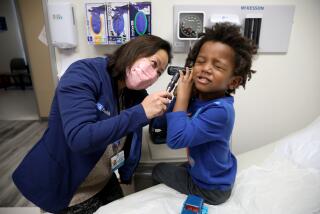Editorial: Overdue for checkups: Denti-Cal program for low-income kids
Fewer than half the low-income kids enrolled in California’s dental insurance program see a dentist in any given year. That seems like a problem. Whether it is, though, is impossible to tell because of the state’s inadequate oversight of the program, known as Denti-Cal. According to a recent audit, the state doesn’t collect the data necessary to determine whether the kids who need care can get it. The state should start measuring the performance of Denti-Cal as if it really cares how well it’s working.
Denti-Cal covers a full range of preventive and medically necessary dental treatments for children in households earning up to 266% of the federal poverty level (about $53,000 for a family of three), along with more limited care for adults with incomes up to 138% of the poverty level. Last year, lawmakers asked the California state auditor to check whether Denti-Cal was making sure the children it covered received the care to which they were entitled. The answer was, in a word, no.
According to Auditor Elaine M. Howle’s report, fewer than 45% of the kids in Denti-Cal saw a dentist in 2013, the most recent year data were available from the federal government. That’s slightly better than in 2011 and 2012, but still the 12th worst among the 49 states measured. Annual checkups are crucial because untreated tooth decay can cause problems with nutrition, learning and speech, and it afflicts at least one of every five children. According to the Centers for Disease Control and Prevention, the percentage of low-income kids with untreated tooth decay is more than twice as high as in the rest of the population.
One likely cause of the low rate of Denti-Cal use is the shortage of Denti-Cal providers in large swaths of the state, Howle found, citing five counties with no dentists willing to take Denti-Cal patients, 11 counties where providers aren’t taking new Denti-Cal patients and 16 additional counties that probably have too few dentists to serve the number of Denti-Cal patients there. Under Denti-Cal, California pays dentists less than a third of what they’d receive from private insurance plans, which may explain why providers don’t want to see these patients. The state is required to review the rates every year to make sure they’re adequate, but Howle found that it did so only twice since 2001.
Prodded by Howle’s report, the state says it will come up with better standards for measuring the availability and use of Denti-Cal services. It is also belatedly starting to enforce a requirement in its contract with Delta Dental, the company it hired to improve Denti-Cal usage rates, to arrange for more Denti-Cal providers in underserved areas. Lawmakers should keep the heat on state officials not just to meet the requirements already in the law and in its contracts, but to set the performance measures and collect the data needed to judge whether Denti-Cal is fulfilling its mission.
Follow the Opinion section on Twitter @latimesopinion and Facebook
More to Read
A cure for the common opinion
Get thought-provoking perspectives with our weekly newsletter.
You may occasionally receive promotional content from the Los Angeles Times.






